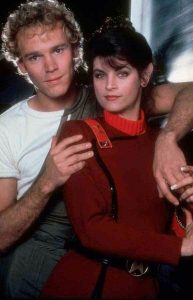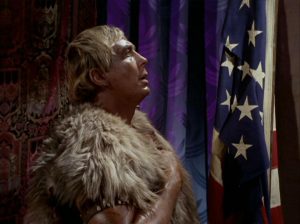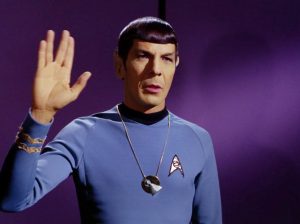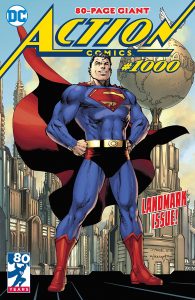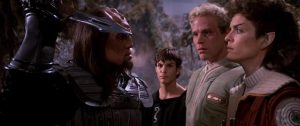 Seeing “Wrath of Khan” again, and remembering the feelings it kindled in me, made me realize what a comedown I was in store for as a fan. These young characters whom I cheered in this film would not survive the next one. My old friends would not be allowed to grow as real people do. I could not help reflecting how sad it was for Sulu, Uhura, Chekov, Saavik and David that we would never see adventures in which they were the heroes. (I’m talking about in the course of televised and movie Trek, here. I’m aware that they all have had their moments in licensed fiction. I wrote some of those moments!)
Seeing “Wrath of Khan” again, and remembering the feelings it kindled in me, made me realize what a comedown I was in store for as a fan. These young characters whom I cheered in this film would not survive the next one. My old friends would not be allowed to grow as real people do. I could not help reflecting how sad it was for Sulu, Uhura, Chekov, Saavik and David that we would never see adventures in which they were the heroes. (I’m talking about in the course of televised and movie Trek, here. I’m aware that they all have had their moments in licensed fiction. I wrote some of those moments!)
What I wanted, what I expected, in 1982 was to see Star Trek both live and grow. To see Kirk continue to age, and teach me how to age, while finding purpose in his life. To see Saavik and David become mature adults. To see Sulu, Chekov and Uhura promoted, instead of stuck in jobs fit for junior officers. I wanted to see more.
Star Trek – The Next Generation was not that. It was set 78 years later so that its creators could rule out the need to have to address what happened to the original characters. It was something called “Star Trek,” but it was not a continuation of the original crew’s adventures. It was a reboot, and it was a reboot so hog-tied by what came before that, despite its amazing popularity, it never knew what the hell it really was as a show. Continue reading


